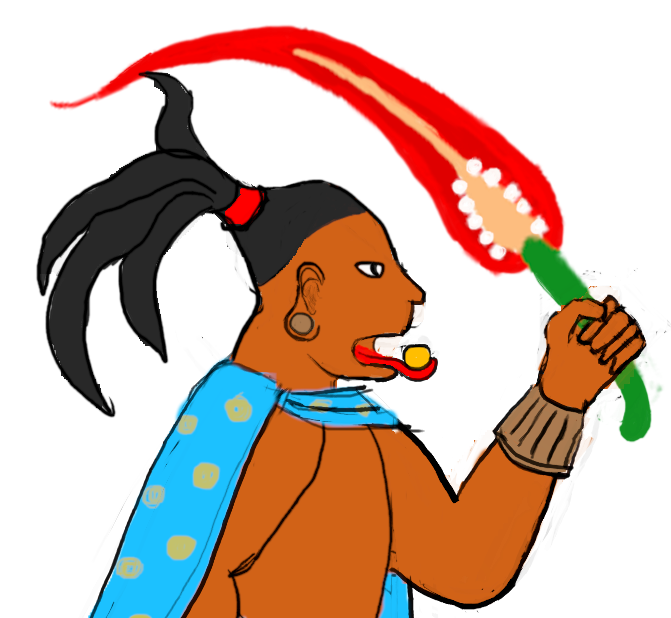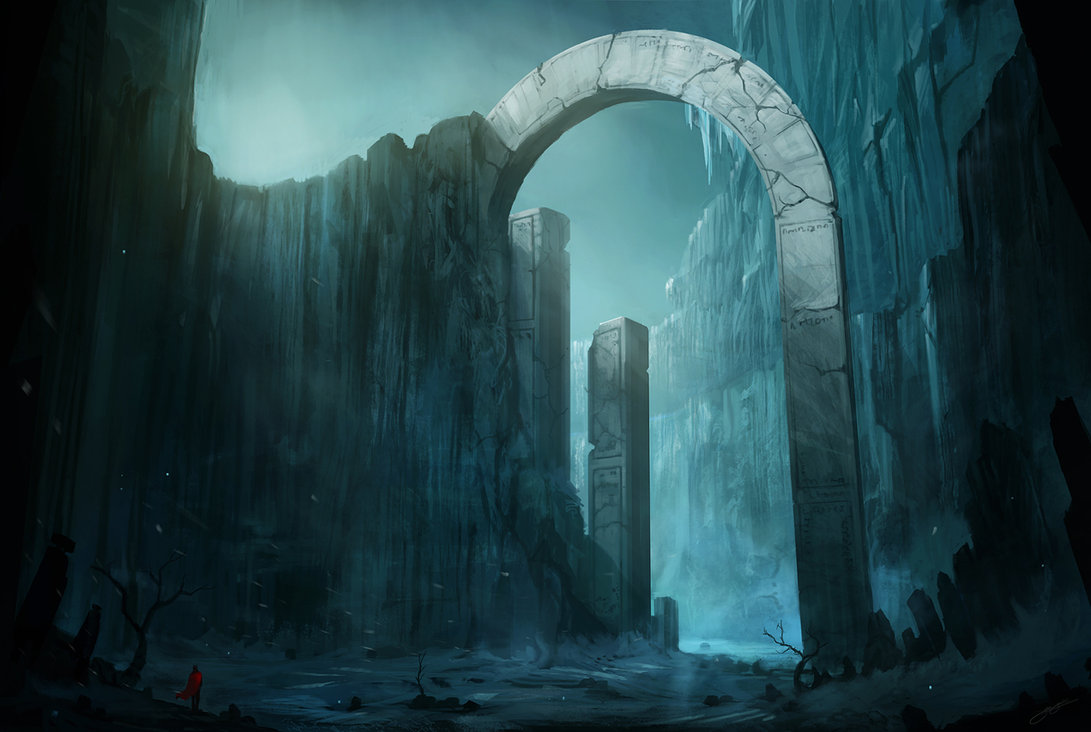I welcome any feedback on this. It's been rough getting it all together and it is still missing so much. I've neglected words in the dictionary as many of these things are still a work in progress. Any problems, contradictions, or even general "Hey, that won't work" kind of issues would be more than appreciated.
A language of small words
The Ozolithian Language is one that started out artificial, naturally evolving as time went on. It was a gift to the people of
Ozlith from their gods. Few speak it in the present, but those that do find it to be a fascinating subject of study. The language was created to be efficient, containing few words that have more than one syllable. The language featured two written form, one for formal use and the other for all other situations. The former is far more interesting as it is an eldritch language that embeds itself in the mind. One doesn't always need to know the language to understand it when read.
With functions like flux vowels and syllabic emphasis, Ozolithian has an emphasis on simplicity and efficiency. Syllabic emphasis is the major contrast between this language and others. Words are broken down into individual syllables which can be used on their own or with other single syllable words that create a new word entirely when combined. When written, the language does not put spaces between words and instead puts spaces between key parts of a sentence or between two complete thoughts.
An example:
Oz: god or gods
Lith: general, often Platonic, love. Usually reserved for family (see Fun Fact: Let Me Count The Ways)
Fun fact: the lands that the gods love
The term "Ozlith" is the only time you will see the word "lith" used in the language. The people of Ozlith simply didn't use it, constructing a new word to mean platonic or familial love. This decision came from the desire to honor the
The Living Gods of Ozlith who the people worshipped heavily in their earlier years. The word also drops the Ozolithian word for land, which is even more peculiar for a language devoted to specifics. "Ozlith" is unique and the only word of its kind in either version of the language.
The basics
Sentence clusters
Sentence clusters are what the language revolves around. Many words nails with your language have one syllable. Many other words in the language have multiple syllables and can be created by combining single syllable words to create a new word, the word Ozlith being a prime example. Ozlith can be spaced from other sentence clusters without punctuation or capitalization because it is not only a complete sentence, but is also a single word that can be used as a noun.
Ozolithian has two different sets of both written and spoken language. Formal Ozolithian is the language in its purest form, being the form handed down by the gods of Ozlith. The informal was created due to a combination of changes, both intentional and naturally occurring, that altered the language's original form for many reasons.
Informal
At the height of the Empire, the informal form of both spoken and written language were far more common, the formal being problematic in many ways. The informal is often easier to learn because it relies on fewer abstract concepts, and can be written using standard forms of text using the Ozolithian alphabet.
The informal is far less focused on contextual information, making conversations easier to have because you can say exactly what you mean, instead of having everything you say and what is spoken to you become a puzzle that needs to be solved by those who don't speak the language.
It's more adaptive and evolved much in its time, later becoming the basis for most human language in the present and is a fundamental ingredient in Com'mon, the most widely spoken language in the world.
Differences
- This allows for variations and dialects since you don't have to be as precise with the rules.
- This does not have any freeform qualities.
Pros
- It's much easier to learn, especially since most languages spoken in the present have evolved from it.
- This continues to grow and evolve in Lartasia where the language is still spoken.
- This features a much more diverse and complex lexicon where new words can be added, often borrowed or vaguely altered from other languages.
Cons
- This cannot be used to achieve Arcane effects.
- Evolves rapidly to the point where a dialect can often appear like an entirely different language.
Formal
Formal Ozolithian has a different set of rules, as well as a different set of symbols representing letters. It allows for personalized forms of those symbols in one's own writing. These personal symbols would later be known as
sigils and
can bring forth arcane effects in speech as seen with
Ozolithian Axioms.
The formal language is cumbersome and in some cases unhealthy to use. Formal Ozolithian is the only other form of viral language seen in the history of the world, the first being the language of the
Alfen Ancestors.
One can understand the intention behind Formal Ozolithian words and feel the emotions behind them, but cannot understand what it means without knowing how to read and speak the language, causing mental strain that can result in insanity.
Differences
- Free form for those who are fluent,
- This relies heavily on accuracy in the rules of the language
Pros:
- When heard or read by somebody who is equally fluent, you will never find your words taken out of context or misunderstood.
- This can be used to achieve more powerful Arcane effects in axioms and sigils
- Personalized alphabets, so long as they are kept consistent with next to no variance when writing, can almost guarantee that whatever is that you are writing is going to be kept secret and can be used as a cipher.
Cons
- Potentially dangerous when heard or read by those not fluent
- Becomes stagnant overtime due to its inability to grow and evolve, making translation difficult.
the differences between the formal and informal are not fully expressed in this article. Formal as lithium will get its own article discussing the specific rules of the language as well as its writing. The remainder of this article will only discuss rules that only pertain to the informal variant animals that the two forms share.
Fun Fact: Lartasian Language
In the nation of Nations, commonly referred to as Lartasia, the informal variant of a language grew and evolved to such a degree it's practically a different language in and of itself, although it follows the same rules. Looking at a word in both languages that mean the same thing can sometimes confusing, as it's hard to determine how the word of all the overtime. Some words have nothing in common with their root, and linguists who study both languages refuse to state that Lartasian is a variant of Ozolithian.
Spelling & Phonology
| ↓Manner/Place→ |
Bilabial | Labiodental | Dental | Alveolar | Palato-alveolar | Palatal | Velar |
| Nasal | m | | | n | | | ŋ |
| Stop | | | | t d | | | k |
| Fricative | | v | θ ð | s z | ʃ | | x |
| Approximant | | | | ɹ | | | |
| Lateral approximant | | | | l | | ʎ | |
|
Front | Back |
| High | i | u |
| Near-high | ɪ | ʊ |
| High-mid | | o |
| Low-mid | ɛ | ɔ ʌ |
| Near-low | æ | |
| Low | | ɑ |
| Phonotactics (WIP) |
|
C= All consonants
V=all vowels
Possible word structures:
CV
VC
CVC
CCVC
CVCC
CCVCC
|
Flux Vowels never appear before or after the same vowel phoneme in a word.
Words with adpositions must place the adposition next to a consonant.
|
C= Consonant inventory:d k l m n s t v x z ð ŋ ɹ ʃ ʎ θ
V=Vowel inventory: i o u æ ɑ ɔ ɛ ɪ ʊ ʌ
|
Illegal Combinations (WIP): (kl), (tv), (tv), (nl), (ml), (dl), (ms), (ns), (ðn), (ðm), (ðk) |






This.. is very detailed. ummm.... Ret kith ozlithim iadal. did I do it right? I need more WORDS! Also, put the existing ones in the dictionary!
Yeah, it wasn't supposed to so much. I was going for a naming language then decided it would have a bigger role... then I was trying to create a language and make it somewhat believable. Its... a task, to both write and read im sure. thanks for taking a look! OH MY GOD you got it perfectly. Ill be adding a flux vowel that relates to I/Me but with what ive written, youre spot on. You love the rules of Ozolithian! Well done! More words are coming and ill be adding the words in the article tonight as well. got to work out phonotactics first sadly. =/
ohhhhh wait, you missed the flux vowel O in Ozolithim. super minor thing cause the sentence still works in the context of World Anvil XD
Maybe add the prefixes and suffixes to the dictionary as well for completeness.
I'll have to reread the part about the extra 'o'. I'm not sure what the rule is.
The O is a redundant flux Vowel that is only really used with the word Ozlith. lol no need to reread the nonsense. Ozlith is more about the land overall, Ozolith is a product of the land. It's people, its culture, its trade goods, etc would all use Ozolithian, as opposed to Ozlithian